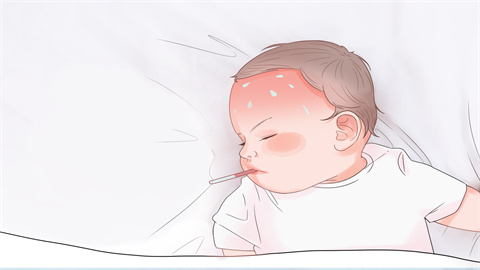What to do if a four-month-old baby has a fever
Generally speaking, fever refers to an elevated body temperature. Fever in a four-month-old infant may be caused by underdeveloped thermoregulatory center, excessive activity or emotional excitement, upper respiratory tract infection, roseola infantum, urinary tract infection, and other reasons. Treatment options include general management and medication therapy, under the guidance of a physician. Detailed explanations are as follows:

1. Underdeveloped Thermoregulatory Center
The thermoregulatory center in infants around four months of age has not fully matured, making them more sensitive to changes in environmental temperature. Body temperature may rise due to high ambient temperatures or overdressing. It is important to maintain a suitable indoor temperature, avoid excessive bundling, and dress the baby appropriately.
2. Excessive Activity or Emotional Excitement
When infants are overly active or emotionally excited, their metabolic rate increases, leading to greater heat production, which may elevate body temperature. It is recommended to appropriately regulate the infant's activity level, maintain emotional stability, and avoid overstimulation.
3. Upper Respiratory Tract Infection
Upper respiratory tract infections are commonly caused by viral or bacterial infections in infants. The inflammatory response triggered by infection can cause fever, often accompanied by symptoms such as nasal congestion and runny nose. Medications such as ribavirin granules, ibuprofen suspension, and pediatric cough syrup may be used under medical guidance for treatment.
4. Roseola Infantum
Roseola infantum is caused by human herpesvirus 6 infection. Viral replication triggers an inflammatory response in the body, leading to high fever, followed by a rash once the fever subsides. Symptoms may also include convulsions and irritability. Patients may use medications such as acetaminophen suspension drops, ribavirin granules, and calamine lotion under the guidance of a physician.
5. Urinary Tract Infection
Urinary tract infection is caused by bacterial invasion of the urinary tract and is common in infants, especially girls. Bacterial infection may cause urinary tract inflammation, resulting in fever, and may also be accompanied by symptoms such as frequent urination, urgency, and painful urination. Patients may be advised by physicians to use medications such as cefuroxime axetil granules, acetaminophen oral solution, and oral rehydration salts (Ⅰ) for treatment.
Normally, ensure the baby wears appropriate and lightweight clothing, maintain a moderate room temperature to avoid extremes of hot or cold, and provide plenty of water to prevent dehydration.






